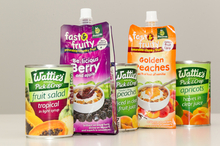Jun 8, 2013

Sales of canned food are dropping because there’s a perception that products in pouches are more modern and therefore better
One fruit processor claims it’s the beginning of the end for the can, but New Zealand’s largest food manufacturer, Wattie’s, says the tin will never die.
International trends show some parts of the canning industry are doomed. A report by UK research firm Key Note predicted tinned desserts and cooking sauces would disappear almost entirely within the next decade because of consumers’ preference for pouches and cartons. The United States canned food market declined by 1 per cent last year.
In New Zealand, canned fruit sales dropped 5.8 per cent last year compared to 2011 while sales of canned vegetables and tinned tuna or chicken increased 0.8 and 4.2 per cent respectively.
General manager of marketing at Wattie’s, Tim Skellern, said he didn’t see a time that the can would be obsolete because it was such a cheap and effective way of storing otherwise perishable food. In some cases, especially tomatoes, canning actually enhanced flavour.
Five per cent of Wattie’s products were now pouched after the company started using the technique about 15 years ago for pet food.
Consumers were driving a change to pouches for a lot of products because the flexible and resealable packaging was thought to be better than canning, Mr Skellern said.
“Consumers perceive it to be better because it’s more modern. In some cases, it’s easier to use and it can be kept in the fridge without decanting the product into another container.”
But because canning technology has been around for so long – almost 80 years – the process is faster.
“The can is definitely here to stay,” Mr Skellern said.
Dave France, spokesman for ENZAFOODS which has just launched a pouched fruit range, said the food could be kept in the pouch for up to five days after opening.
It also meant fruit didn’t have to be preserved in juice or syrup.
“I guess you could say the days of the can could well be numbered.”
Australian retail expert Darryl McCowen said the pouched produce had revitalised the declining preserved fruit category.
“There’s been nothing new to grow this category. Young people don’t buy canned food anymore, they want portable food that suits their busy lifestyles,” Mr McCowen said.
Author Wendyl Nissen said the fact pouches were not recyclable would put some people off.
